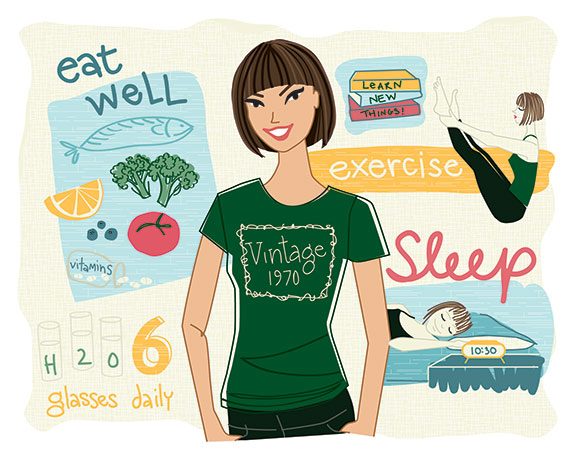
Syndicated columnist Abigail Van Buren, aka Dear Abby, once wrote, “Some wines improve with age. But only if the grapes were good in the first place.”
If you’re among the savvy middle-agers who are rejecting the inevitability of physical deterioration, and attempting to grow old as gracefully as an ’82 Haut-Brion Bordeaux, take heart. More and more health-conscious people are energetically embracing the anti-aging movement because, although they can’t turn back time, they can influence how they age.
Dr. Lorraine Maita (973-218-1199; howtoliveyounger.com) with offices in Summit and Basking Ridge is a pioneer in the evolving field of preventive-aging science. Board-certified in internal medicine with more than twenty years of experience in preventive health and wellness, she formerly served in executive medical positions with Prudential Financial, Pfizer, and Johnson & Johnson.
Who says you can’t put new wine in old bottles? Maita contends that more than 75 percent of degenerative diseases related to aging can be prevented, delayed, or even reversed through early detection and treatment of age-related dysfunctions.
“It takes effort, but is definitely worth the time,” she says. “With comprehensive preventive-aging therapy, anyone can age at a slower pace and experience renewed vitality. We now have the ability to enhance overall health and enjoy heightened energy, physical performance, body composition, and strength.” In fact, the doctor says she can help improve immune function, mental acuity, sexual vitality, skin health, blood pressure, and cholesterol levels.
That’s a tall order, to be sure. But Maita and others in her field are true believers. “Preventive-aging therapy isn’t about working miracles, and there’s no magic bullet for good health,” she says. “It’s all about lifestyle, environment, family history, and other risk factors. The work we do is based on scientific findings that help generate extremely individualized wellness plans for patients.”
The good news is that it’s suddenly possible to delve into your personal metabolic profile to learn how your body metabolizes foods and environmental toxins, and how to halt or reverse any adverse effects. And that means that science really can help you grow younger.
After Maita evaluates each patient’s physical and mental performance, she delves into blood, metabolic, and nutritional analyses. She then presents a customized 20- to 40-page report that recommends a detailed nutrition plan, exercises, lifestyle modifications and, sometimes, hormone therapy for both sexes.
“Because of a lifetime of unhealthy choices, some people actually function at the level of someone who is 15-20 years older,” Maita concludes. “The best time for women and men to take full advantage of preventive-aging therapy is between the ages of 35 and 75—the earlier the better, and it’s never too late to start.”
That deserves a toast. Here’s to aging elegantly with depth and character—just as a fine vintage port.
10 Ways to Feel Younger, Longer
• Eat foods rich in antioxidants and omega-3 fatty acids.
• Consume fruits and vegetables in every color of the rainbow, every day.
• Limit sugar, salt, processed foods, trans-fats, caffeine and alcohol.
• Maintain a regular exercise program that promotes strength, flexibility, endurance and balance.
• Try to drink at least six 8-ounce glasses of pure water daily.
• Stimulate the mind through continued learning.
• Accentuate the positive and eliminate stressors. Attitude is everything.
• Take vitamin supplements according to individual needs and
risk factors.
• Get regular physicals and screening exams.
• Treat yourself to 6-8 hours of refreshing sleep nightly. Sound sleep produces important growth and other hormones.




